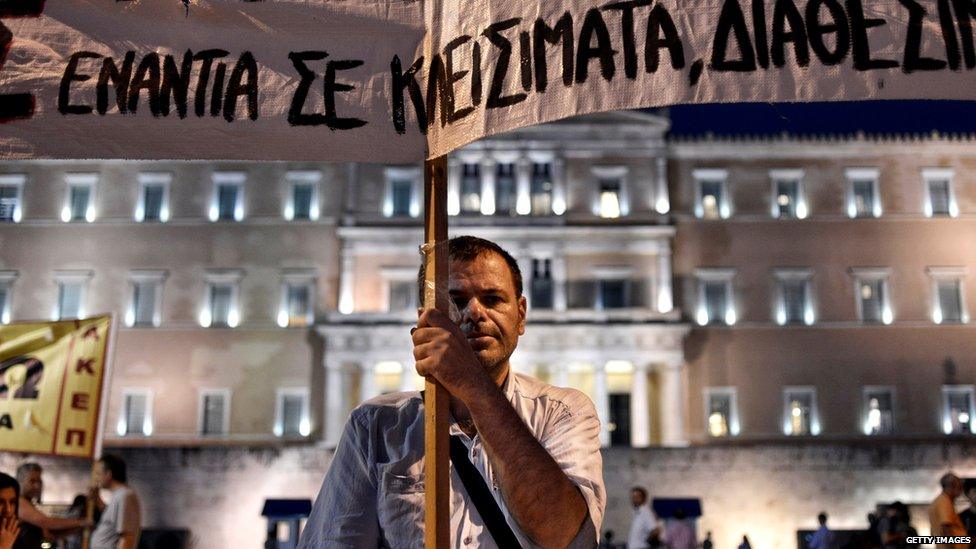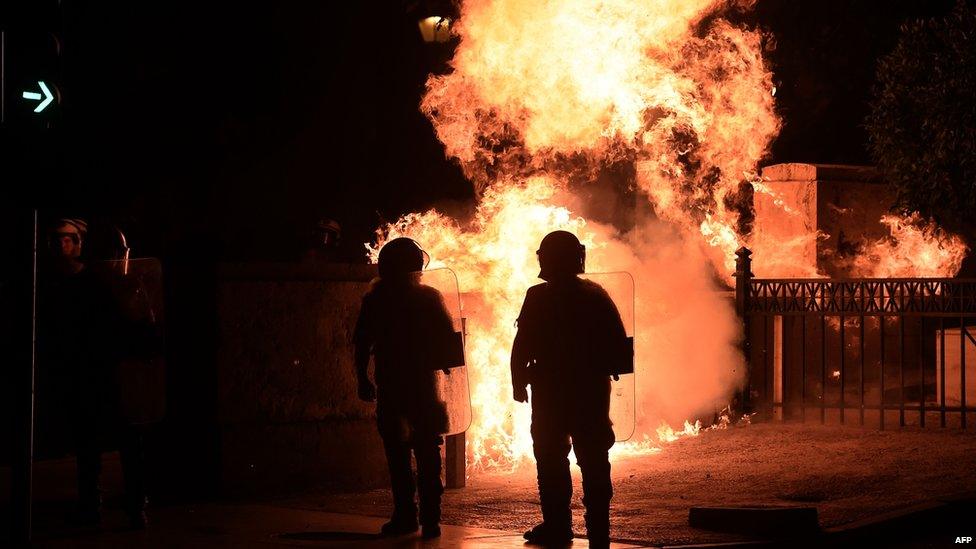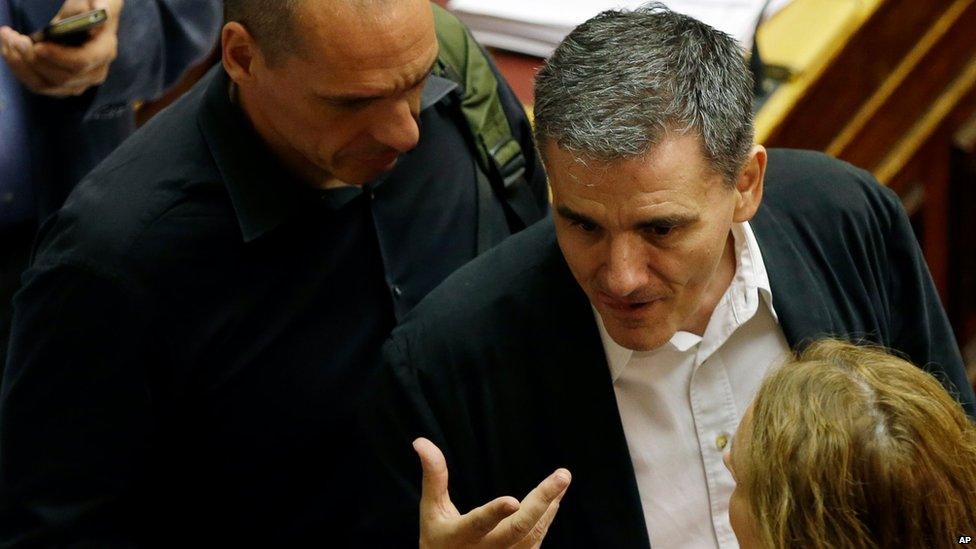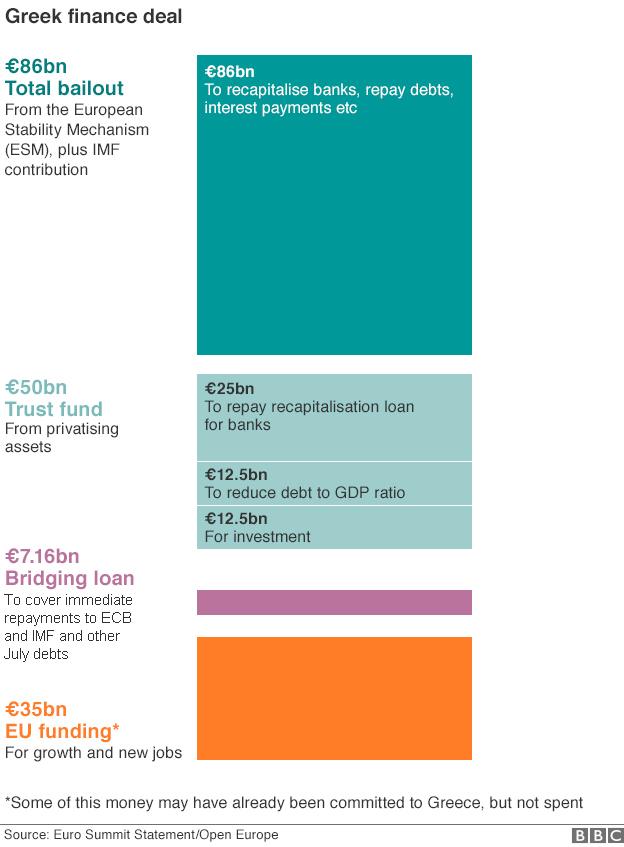Greece crisis: MPs to vote on crucial reforms
- Published

Several thousand people gathered outside parliament to protest against further austerity measures
Greek MPs are debating a second set of reforms they need to approve to secure a €86bn bailout, as thousands protest against further austerity measures.
The protest outside parliament briefly turned violent, with petrol bombs and stones thrown at police.
Earlier, Greece's PM urged rebels within his own Syriza party to support the reforms demanded by creditors.
Meanwhile, the European Central Bank (ECB) has increased its cash lifeline to Greek banks.
The emergency injection of an extra €900m (£630m), the ECB's second in a week, came just hours before the vote.
It is needed until Greece secures its third international bailout - the negotiations of which cannot begin until Greece's parliament has approved the tough new reforms.

The protest in Athens' Syntagma Square - called by Greece's public sector union - was reported to have been largely peaceful, until a number of petrol bombs were thrown in the direction of police.
The BBC's Piers Scholfield, tweeted from the scene, external that a small number of anarchists - no more than a few dozen - attempted to create a disturbance but the situation soon calmed down.

The former and current Greek finance ministers, with opposing views on the reforms under debate
Inside parliament, PM Alexis Tsipras turned up the heat on members of his own party who had voted against last week's reforms, accusing them of "hiding behind the safety of my signature".
The proposed reforms are expected to get parliamentary approval with the support of opposition parties, but Mr Tsipras hopes to avoid a rebellion from within the ranks of Syriza.
Some 32 of the radical-left party's 149 MPs - including former Finance Minister Yanis Varoufakis - voted against the first tranche of bailout measures last week. Another six abstained.
The rebellion reduced Mr Tsipras's support within his own ruling coalition to 123 MPs, barely more than the minimum 120 required to sustain a minority government.
He said the Greek people had "pinned their hopes" on the government's ability to find a solution to the debt crisis, addressing Syriza MPs on Tuesday night.

Defining moment for Tsipras - by Chris Morris, BBC News, Athens
For a man who was forced into a fairly abrupt U-turn, Alexis Tsipras remains extraordinarily popular.
If he calls an early election in the coming months - and that still feels like the most likely option - it would be a huge surprise if he didn't win comfortably and emerge stronger.
That's partly because the opposition is in disarray. But also because many Greeks like the fact that he appeared to stand up for national pride.
For the moment Mr Tsipras is trying to put pressure on dissenters within his own party. He had heard plenty of heroic speeches, the prime minister said, but not seen any alternative proposals.
It's partly a reminder that he could move to exclude those who are disloyal if another election is just around the corner.
But he has to get the bailout approved first - and that's not yet a done deal.

Finance Minister Euclid Tsakalotos said it was "extremely important" for the vote on financial and judicial reforms to pass so that talks on the bailout could begin on Friday.
Last week's vote was on the austerity measures imposed by Greece's creditors - a mix of economic reforms and budget cuts demanded by the eurozone countries and institutions before bailout talks could continue.
The measures due to be presented to parliament on Wednesday are of a more structural nature, including:
a code of civil protection aimed at speeding up court cases
the adoption of an EU directive to bolster banks and protect savers' deposits of less than €100,000
the introduction of rules that would see bank shareholders and creditors - not taxpayers - cover costs of a failed bank
More contentious measures - phasing out early retirement and tax rises for farmers - have been pushed back to August.
Reforms include changes to the Greek banking system and an overhaul of the judicial system
Asked if the threat of a Greek exit from the euro - or Grexit - had passed, EU Economic Affairs Commissioner Pierre Moscovici said on Tuesday: "I think we've made a big step in that direction."
The International Monetary Fund (IMF) confirmed on Monday that Greece had cleared its overdue debt repayments of €2.05bn and was no longer in arrears.

The repayments, which included €4.2bn to the ECB, were made possible by a short-term EU loan of €7.16bn.
Greece's next major deadline is 20 August, when it must pay €3.2bn owed to the ECB, followed by a payment of €1.5bn to the IMF in September.
The Greek government received a small boost on Tuesday when credit ratings agency Standard & Poor's raised the country's rating by two notches to CCC+ from CCC-.
On Monday, Greek banks reopened after being closed for three weeks but many restrictions remain and Greeks are facing price rises after an increase in VAT.

Are you in Greece? Please email haveyoursay@bbc.co.uk, external with your experiences.
Please include a contact number if you are willing to speak to a BBC journalist. You can also contact us in the following ways:
Whatsapp: +44 7525 900971
Send pictures/video to yourpics@bbc.co.uk, external
Tweet: @BBC_HaveYourSay, external
Send an SMS or MMS to 61124 or +44 7624 800 100